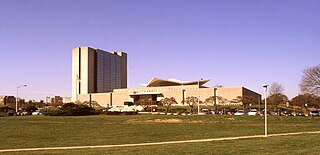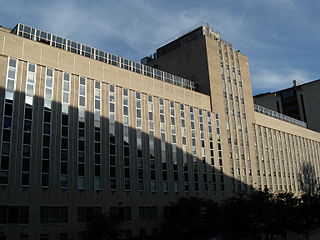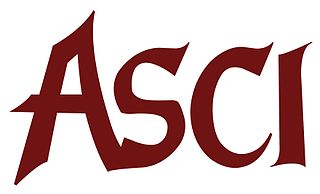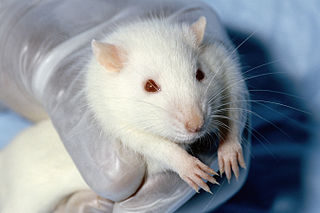
The United States National Library of Medicine (NLM), operated by the United States federal government, is the world's largest medical library.

Baylor College of Medicine (BCM), located in the Texas Medical Center in Houston, Texas, US, is a health sciences university. It includes a medical school, Baylor College of Medicine; the Graduate School of Biomedical Sciences; the School of Allied Health Sciences; and the National School of Tropical Medicine. The school, located in the middle of the world's largest medical center, is part owner of Baylor St. Luke's Medical Center, part of the CHI St. Luke's Health system, and has hospital affiliations with: Harris Health System, Texas Children's Hospital, The University of Texas MD Anderson Cancer Center, Memorial Hermann – The Institute for Rehabilitation and Research, Menninger Clinic, the Michael E. DeBakey Veterans Affairs Medical Center and Children's Hospital of San Antonio.
The International Medical Informatics Association (IMIA) is an independent organization that plays a role in promoting and furthering the application of information science in modern society, particularly in the fields of healthcare, bioscience and medicine. It was established in 1967 as a technical committee of the International Federation for Information Processing (IFIP). It became an independent organization in 1987 and was established under Swiss law in 1989.

The Wellcome Library is founded on the collection formed by Sir Henry Wellcome (1853–1936), whose personal wealth allowed him to create one of the most ambitious collections of the 20th century. Henry Wellcome's interest was the history of medicine in a broad sense and included subjects such as alchemy or witchcraft, but also anthropology and ethnography. Since Henry Wellcome’s death in 1936, the Wellcome Trust has been responsible for maintaining the Library's collection and funding its acquisitions. The library is free and open to the public.
A health or medical library is designed to assist physicians, health professionals, students, patients, consumers, medical researchers, and information specialists in finding health and scientific information to improve, update, assess, or evaluate health care. Medical libraries are typically found in hospitals, medical schools, private industry, and in medical or health associations. A typical health or medical library has access to MEDLINE, a range of electronic resources, print and digital journal collections, and print reference books. The influence of open access (OA) and free searching via Google and PubMed has a major impact on the way medical libraries operate.
The Academy of Medical Sciences is an organisation established in the UK in 1998. It is one of the four UK National Academies, the others being the British Academy, the Royal Academy of Engineering and the Royal Society.
The Council for International Organizations of Medical Sciences (CIOMS) is an international nongovernmental organization established jointly by WHO and UNESCO in 1949. CIOMS represents a substantial proportion of the biomedical scientific community through its member organizations. The mission of CIOMS is to advance public health through guidance on health research including ethics, medical product development and safety.

The University of Pittsburgh School of Medicine (UPSOM) is a medical school located in Pittsburgh, Pennsylvania. The School of Medicine, also known as Pitt Med, is consistently ranked as a "Top Medical School" by U.S. News & World Report in both research and primary care. UPSOM is currently ranked 13th in the category of research and 14th in primary care by U.S. News for 2020, and is separately ranked 17th in the Academic Ranking of World Universities list of best medical schools in the world. The school encompasses both a medical program, offering the doctor of medicine, and graduate programs, offering doctor of philosophy and master's degrees in several areas of biomedical science, clinical research, medical education, and medical informatics.
The Texas Medical Center (TMC) Library is a health sciences library located in the Texas Medical Center (TMC) in Houston, TX. The TMC Library is the only major medical and scientific library serving the entire 1,345 sq. acre Texas Medical Center (TMC) campus and its non-profit institutions. It offers librarian services, and provides biomedical information for education and research activities to take place, and study space for students for these schools to help maintain their accreditation.
Albert R. Jonsen is a biomedical ethicist and author. He is Emeritus Professor of Ethics in Medicine at the University of Washington, School of Medicine, where he was Chairman of the Department of Medical History and Ethics from 1987-1999, and currently is Co-Director of the Program in Medicine and Human Values at California Pacific Medical Center in San Francisco.
Rubicon Foundation, Inc. is a non-profit organization devoted to contributing to the interdependent dynamic between research, exploration, science and education. The foundation, started in 2002, is located in Durham, North Carolina and is primarily supported by donations and grants. Funding has included the Office of Naval Research from 2008 to 2010. Gibson, Dunn & Crutcher has provided pro bono services to assist in copyright searches and support.
The Undersea and Hyperbaric Medical Society (UHMS) is an organization based in the US which supports research on matters of hyperbaric medicine and physiology, and provides a certificate of added qualification for physicians with an unrestricted license to practice medicine and for limited licensed practitioners, at the completion of the Program for Advanced Training in Hyperbaric Medicine. They support an extensive library and are a primary source of information for diving and hyperbaric medicine physiology worldwide.
Edward ("Ted") Hance Shortliffe is a Canadian-born American biomedical informatician, physician, and computer scientist. Shortliffe is a pioneer in the use of artificial intelligence in medicine. He was the principal developer of the clinical expert system MYCIN, one of the first rule-based artificial intelligence expert systems, which obtained clinical data interactively from a physician user and was used to diagnose and recommend treatment for severe infections. While never used in practice, its performance was shown to be comparable to and sometimes more accurate than that of Stanford infectious disease faculty. This spurred the development of a wide range of activity in the development of rule-based expert systems, knowledge representation, belief nets and other areas, and its design greatly influenced the subsequent development of computing in medicine.
Leslie Alexander Geddes was an electrical engineer and physiologist. He conducted research in electromyography, cardiac output, cardiac pacing, ventricular defibrillation, and blood pressure. He discovered and demonstrated precisely the optimal sites on the chest for defibrillation or pacing.

The University of Central Florida College of Medicine is an academic college of the University of Central Florida located in Orlando, Florida, United States. The dean of the college is Deborah C. German, M.D. The school was purchased by HCA in August 2017. This has led to a strict ban of all students from doing any rotations in Orlando's two largest hospitals, Florida Hospital and Orlando Health.

The American Society for Clinical Investigation (ASCI), established in 1908, is one of the oldest and most respected medical honor societies in the United States.
The Association of American Physicians (AAP) is an honorary medical society founded in 1885 by the Canadian physician Sir William Osler and six other distinguished physicians of his era for "the advancement of scientific and practical medicine." Election to the AAP is an honor extended to individuals with outstanding credentials in biomedical science and/or translational biomedical research and is limited to 60 persons per year. The AAP includes about 1000 active members and 550 emeritus and honorary members. The great majority are US citizens. However, other countries are also represented.

Capt. Charles Wesley Shilling USN (ret.) was an American physician who was known as a leader in the field of undersea and hyperbaric medicine, research, and education. Shilling was widely recognized as an expert on deep sea diving, naval medicine, radiation biology, and submarine capabilities. In 1939, he was Senior Medical Officer in the rescue of the submarine U.S.S. Squalus.

National Yang-Ming University is a research university located in Shipai, Beitou District, Taipei, Taiwan. It is famous for research in fields of Medicine, Life Sciences and Biotechnology. In the 2010 QS Asian Universities Rankings, Yang Ming University was placed 4th among universities in Taiwan and 2nd in the field of Life Science & Biomedicine.










